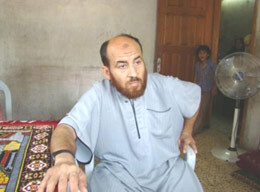The Electronic Intifada 21 August 2008

Ahmed Abu Shawish is confined to his home in Gaza City, waiting for a permit to enter Israel. (PCHR)
Ahmed Hisham Abu Shawish is 46 years old, but he looks older. His skin is tinged with grey and he sits slumped forward in his chair. He used to work full time at the Islamic University doing logistical support, but these days is confined to his home in the al-Daraj district of northern Gaza City. He has an aggressive carcinogenic tumor, and suffers from serious hematuria, or blood in his urine. He has to attend hospital every two or three days in order to receive regular blood transfusions. “I go to the European Hospital in Khan Younis for my treatment” he says. This involves a painful journey by shared public taxi several times a week, as the hospital is 30 kilometers away, and the family cannot afford to pay for a private taxi to and from their home.
Ahmed Abu Shawish urgently needs an operation to remove his cancer and repair the internal damage. “The [Palestinian] Ministry of Health referred me to Echelof Hospital in Tel Aviv for specialist treatment” he says. “But of course I need a permit to leave Gaza, and my permit was denied. So I applied again with the help of human rights organizations.” The Israeli non-governmental organization Physicians for Human Rights and the Gaza City-based Palestinian Centre for Human Rights (PCHR) worked together to try to secure a permit for Ahmed Abu Shawish to be able to travel to Echelof Hospital. But on 18 August he was denied a permit once again. PCHR has submitted a formal complaint to the Israeli State Attorney, outlining the urgency of Ahmed Abu Shawish’s case, and asking he be immediately issued a permit by Israel in order to travel to Echelof Hospital for his treatment. In the meantime, Ahmed Abu Shawish is confined to his home, where he lives, and waits, in pain, discomfort and uncertainty.
Ahmed Abu Shawish is one of hundreds of Gazans whose lives are suspended because they cannot access the medical treatment they urgently need. According to figures from the Palestinian Ministry of Health (MOH), 600-700 Gazans are currently applying to Israel for permits to exit the Gaza Strip via Erez Crossing in order to access urgent medical treatment outside of the Gaza Strip, or else already waiting for responses from the Israeli authorities to their applications that they have already submitted. Gazan patients are referred for medical treatment to the West Bank, Israel or abroad only if they cannot access the appropriate treatment in Gaza. Nevertheless, approximately 50 percent of those who apply for permits are denied, although, bar the rhetoric of “Israeli security concerns” they are never informed why they are being denied access to medical treatment that will save their health, and sometimes their life.
From June 2007 to June 2008, PCHR documented the deaths of 40 Gazan patients, including 13 women and nine children, who died either because they were denied permits by Israel, because their permits were delayed, or because they could not obtain the medicine in Gaza that they needed in order to survive. The ongoing siege of the Gaza Strip has decimated Gaza’s infrastructure, stretching education, sanitation and health services to breaking point. Hospitals in Gaza are simply not well enough equipped to carry out the kind of delicate and highly invasive surgery that Ahmed Abu Shawish so urgently needs.
The Egypt brokered tahdia or “calming” that came into force on 19 June was supposed to see restrictions on Gazans, including severe restrictions on freedom of movement, being gradually lifted. However, two months into the tahdia, there have been no major changes regarding freedom of movement for the 1.5 million civilians who continue to be imprisoned inside the Gaza Strip.
If Ahmed Abu Shawish does not receive a permit enabling him to travel to Echelof Hospital in Tel Aviv very soon, he will have to resort to having his surgery inside Gaza. “The doctors at the European Hospital advised me to go to Israel for my treatment” he says. “The risks of being treated here are much bigger — and I tell you, I am frightened at the prospect of having surgery for my cancer here. How do you think I feel when even my own doctors are telling me that, for my own sake, I need to go and have my surgery in hospital in Israel?”
This report is part of the Palestinian Centre for Human Rights’ Narratives Under Siege series.
Related Links

